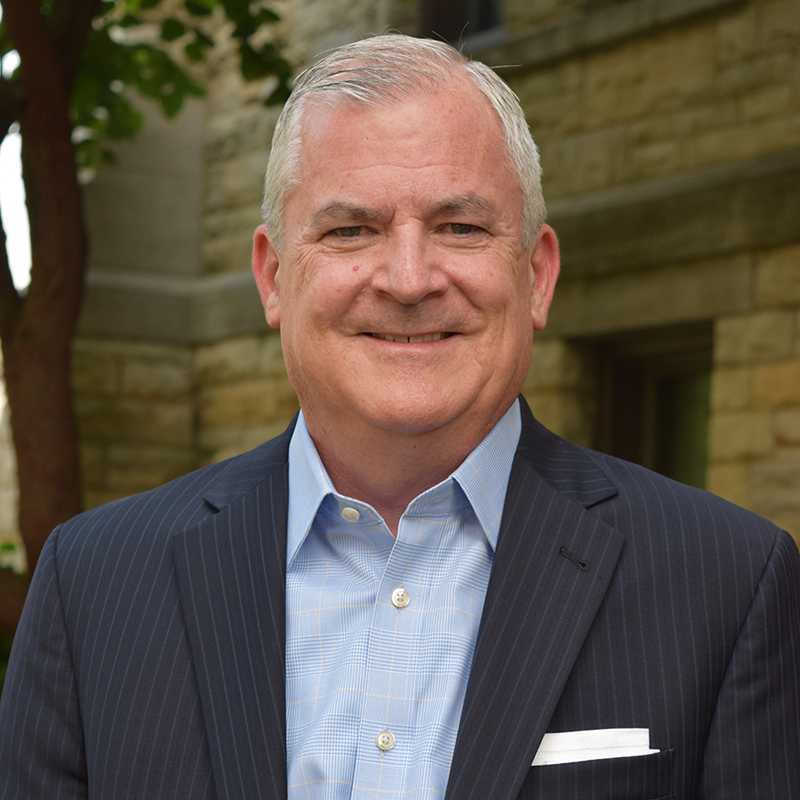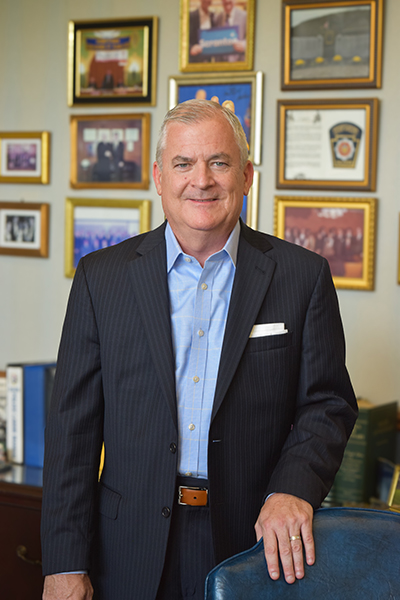Political Science Alumnus Todd Eagen '90 is Labor Law Attorney and Democratic National Committee Member

Meet Todd Eagen '90
- Job Title & Employer
- Attorney, Welby, Stoltenberg, Cimballa & Cook, LLC
- Major/Program
- Political Science
- College Activities
- Parliamentarian, student defender and chairman of the rules committee for United Student Government; student member of the Publication Board
- Hometown
- Scranton, Pa.
- High School
- Scranton Central High School
- Now Living In
- Dunmore, Pa.
- Hobbies & Interests
- Politics, travel and family time
"When I drive past Point Park's campus now, walk through the bookstore or visit the new Pittsburgh Playhouse, the University has really expanded, and it’s an even greater environment for students to learn, meet friends and have a good college experience. The same reasons I went there are still alive and in even greater effect today."
Why did you want to major in political science?
I started in politics in 1977 when I was 10. It was the first time I stood at a polling place and handed out cards for a candidate. That candidate happened to be my father, who was running for district attorney. That election was the first election that I was heavily involved with, and it taught me a good lesson because my father lost. If you went by the local polls, he was the favorite. I started working in campaigns at age 10, and I never stopped.
By the time I got through high school and it came time for me to sit down with an advisor to determine my path, a career questionnaire pointed me in the direction of law. I knew I wanted to go to law school, but I was also very interested in politics. Political science is always a good major heading into law school.
What did you like about Point Park’s program?
I liked the size of the classes. In my freshman year, when we were taking our 101’s, I think the biggest class was maybe 30 people. I came from a decent-sized high school and graduated with about 350 people. I wanted a school that was smaller in size so I could build relationships with my professors. Point Park's location in Pittsburgh also interested me. I was born in Philly but grew up in Scranton mainly. Exploring a new city appealed to me.
What did you do after graduation?
After Point Park, I moved back to Scranton, worked for a couple of law firms and volunteered on political campaigns. Gov. Bob Casey Sr. had won in 1986 and then ran for reelection in 1990, so I worked on that campaign. Then I decided to go to law school and attended Cooley Law School in Michigan for my first year. I knew I wanted to go to school in Pennsylvania. I had good test scores, but my grades at Point Park weren’t quite up to snuff to get into the schools in Pennsylvania. When I went to Cooley, I ended up being #7 in my class the first year, so I knew there was an opportunity to move back to Pennsylvania. I also knew I wanted to work in Pennsylvania, so having those networks through a Pennsylvania school benefitted me. I transferred to Penn State Dickinson Law, graduated and clerked for a federal judge.
How did you launch your career in labor law?
My grandfather was a lawyer. My father practiced personal injury medical malpractice. My uncle and cousins also do medical malpractice and personal injury. I didn’t want to do that, so I clerked for a federal judge in Scranton, Judge William J. Nealon, in 1996. He was appointed judge in 1962 by John F. Kennedy. Working for him was a great experience. While I was there, I met Attorney Robert D. Mariani, a local attorney representing unions. That’s how I got into labor law. I didn’t even take labor law in law school, but Bob was an interesting guy, and unions were familiar with me volunteering with the Democratic Party.
I worked for Bob for seven years, and he taught me everything about labor law and representing unions. We represented the Teamsters, United Food and Commercial Workers, carpenters, sheet metal workers, teachers, just about any union you can think of. Then Bob was appointed a federal judge in Scranton, so I had to look for a new opportunity. I connected with Welby, Stoltenberg, Cimballa & Cook, LLC in Harrisburg, which I’ve been with since 2004. I worked for them for a year in Harrisburg and commuted from Scranton to see if we were a good fit. We opened the Scranton office in 2005.
I’ve represented individuals and unions all across Pennsylvania. In federal court, I had the first favorable jury verdict for a plaintiff under the Family Medical Leave Act in the Commonwealth. I also had a class action where I represented 4,500 state employees who were being discriminated against under the Americans with Disabilities Act, and I forced the state to change its policies in that regard. I also had a case where I represented an individual who was being denied a pension benefit, and I had to go into federal court just to get that individual a pension. So I do labor law, as well as individual employment law and discrimination cases.
Out of 67 counties, I've probably been in 25 of them representing union members. It certainly wasn’t any plan of mine to have a statewide practice, but that’s what really helped me when I ran for the Democratic National Committee in Pennsylvania (DNC). With those union contacts across the state, I made a lot of connections.
What do you find most fulfilling about this type of work?
I really get a sense that I’m helping people. If you think about the justice system, a lot of people focus on the criminal justice system and how that affects people’s lives, but when you think about somebody’s job and their livelihood, that’s economic justice. I fight for greater benefits and better working conditions. I’m helping people on a day-to-day basis. I’ve probably gotten some ulcers over it because I take it to heart. If somebody gets fired, I’m trying to fight for their job back. Sometimes the facts are just against me, but I fight hard for that person because I want to make a difference in that person’s life. That’s what’s fulfilling for me – trying to make a difference and trying to give people a leg up in their work environment, which affects the home environment.
 Describe your role with the DNC.
Describe your role with the DNC.
The DNC in Pennsylvania elects eight members. On the Democratic State Committee, there are about 353 members. Every four years, they elect their representatives to the DNC. That happens in the presidential year, so four years ago I was elected for the first time. Before that, I worked as a local committee man in other roles.
As representatives, we’re facilitators and we act as a conduit to the DNC for the state and county parties. My role is multipurpose. I try to make sure the DNC is bringing the resources we need into Pennsylvania. We’re a battleground state, and a lot of times that makes it easy because the DNC is focused on us anyway, but I also make sure that our congressional candidates get the support they need. We help the DNC get the volunteers that they need here locally. There’s also a fundraising aspect to my role.
I just got reelected to another four years, and I really enjoy my role. We go to three meetings a year and vote on different items. We’re also heavily involved in how to pick the presidential candidates and where the convention is held.
What advice do you have for current political science students?
Get involved. In this field, it doesn’t have to be a formal internship, but there’s a lot of opportunities to volunteer. If you volunteer on a local campaign or at the local party office, you’ll meet people in your field. You’re going to create opportunities for yourself. Those are the people who will be able to connect you with people who can hire you.
For students interested in law school, the best thing you can do is reach out to an attorney. If you’re at Point Park and you plan on staying in Allegheny County, get to know a local lawyer. Do some job shadowing. Maybe it leads to a summer internship. Look for volunteer opportunities at legal clinics in your area.
Lastly, take any courses in speech and debate or writing because you have to be a decent writer, and whether you want to be a litigator or not, you’re going to have to be on your feet in law school. Start getting on your feet and practicing.
What are the benefits of living and learning in Downtown Pittsburgh?
Internships and job opportunities, even on a part-time basis, are in Downtown Pittsburgh. There’s also the social benefit of being in that city environment. We used to walk over to Pittsburgh Pirates games or see shows at the theaters. Being in a city, there was more happening, more opportunities. I loved that.
Why would you recommend Point Park to a prospective student?
When I walked through the doors, I was shy and didn’t really know what I wanted to do in life. Point Park gave me confidence through its friendly, welcoming environment. It was a smaller learning environment so it allowed me to focus more. I didn’t feel like I was a number. The same qualities that impacted me are still alive today on campus and even more so than when I was a student. When I drive past Point Park's campus now, walk through the bookstore or visit the new Pittsburgh Playhouse, the University has really expanded, and it’s an even greater environment for students to learn, meet friends and have a good college experience. The same reasons I went there are still alive and in even greater effect today.

